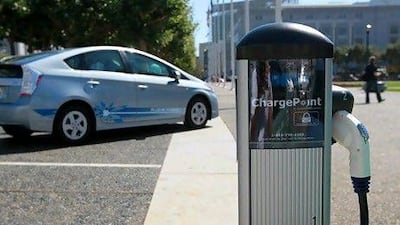Americans are rightly focused on the "fiscal cliff" looming at the start of next year, when, under current legislation, virtually all tax rates will rise, sucking more than 3 per cent of GDP out of households and businesses.
In addition, automatic cuts in government spending on defence and non-defence programmes will subtract nearly another 1per cent of GDP next year. And the fiscal cliff is only part of the problem that must be solved.
The bigger problem is that the United States has an enormous fiscal deficit - now about 7 per cent of GDP and predicted to grow rapidly.
Fiscal consolidation requires additional revenue as well as slower growth in entitlement spending.
My guess is that soon after the general election, the US congress will vote to postpone the fiscal cliff for about six months to allow time to work out an acceptable legislative solution. That solution will involve slowing the growth of social security pension benefits for future middle and upper-income pensioners.
The tougher problem will be how to raise revenue. The key will be to focus on the many special features of the tax code that are equivalent to government spending. If I buy a hybrid car, install a solar panel at my home or upgrade to a more efficient water heater, I get a tax credit. And if I buy a bigger home or just increase the size of my mortgage, I receive a larger deduction that reduces my taxable income, lowering my tax bill.
While the government is not giving me money, these special targeted tax breaks are no less "government spending" than they would be if the government sent me a cheque.
These features are rightly called "tax expenditures" because they describe the government spending that occurs through the tax code. Eliminating or reducing these tax expenditures should therefore be regarded as cutting government spending. Although the effect is to raise revenue, that is just an accounting convention. The fundamental economic effect is to reduce government spending.
The key to raising revenue is to reduce tax expenditures, use some of the resulting revenue to reduce tax rates, and devote the rest to reducing future deficits. So here is an idea that might work politically. Let taxpayers keep all of the current tax expenditures, but limit the total amount by which each taxpayer can reduce his or her tax liability.
I have explored the idea of "capping" the benefit that individuals can receive as a percentage of their total income (their "adjusted gross income", or AGI in US tax parlance). Applying a 2 per cent of AGI cap to the total benefit that an individual can receive from tax expenditures would have a powerful effect.
It would not limit the amount of deductions and exclusions to 2 per cent of AGI, but rather would limit the resulting tax reduction - that is, the tax benefit - that the individual receives by using all these special features. For someone with a 15 per cent marginal tax rate, a 2 per cent of AGI cap would limit total deductions and exclusions to about 13 per cent of AGI.
Such a cap would have a significant impact on the fiscal outlook. Even if the cap were applied only to "itemised deductions" and health-insurance exclusion, it would raise about US$250 billion (Dh918.25bn) in the first year and about $3 trillion over the first decade.
There are many options in designing such a policy. The cap rate could be higher, or it could start higher and be gradually tightened, or it could vary with an individual's income level. But the economic and political attractiveness of a cap consists in its ability to raise substantial revenue without eliminating specific tax expenditures.
Martin Feldstein is a professor of economics at Harvard and was chairman of president Ronald Reagan's council of economic advisers
* Project Syndicate

